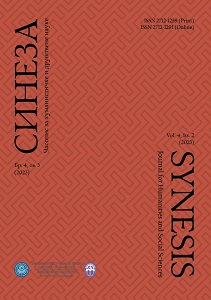Radna memorija kao distinktivno svojstvo između obrade tipa 1 i tipa 2 u teorijama dualnih procesa
Working memory as a distinctive property between type 1 and type 2 processing in dual process theories
Author(s): Milica Damnjanović, Kaja DamnjanovićSubject(s): Logic, Philosophy of Mind, Cognitive Psychology
Published by: Filozofski fakultet, Univerzitet u Banjoj Luci
Keywords: dual process theories; type 1 and type 2 processing; working memory; logical intuitions; mindware;
Summary/Abstract: Human thinking can be described as an interplay between two types of processing – type 1, fast, intuitive and non-dependent of working memory (WM), and type 2, slow, deliberate heavily dependent on WM. This distinction is pivotal in dual process theories, which have associated type 1 processing with biased responses, holding type 2 accountable for rational reasoning. Although newer findings suggest that intuitive processing can yield normatively correct responses, the assumption that WM represents the key differentiator of two types of reasoning still pervades through all dual process theories. In this paper, we provide arguments which support the idea that WM represents the underlying mechanism of type 2 processing, yet we point out the arguments which refute the idea that type 1 processing is non-dependent of its resources. The arguments stem from hybrid models of dual processes which, in addition to commonly recognized heuristic intuitions, propose logical intuitions (LI) as products of type 1 processing. LI enable direct problematization of the role of WM in two types of processing due to their dual nature. Outcomes of LI represent outcomes of type 2 processing, while their mechanism is type 1 processing. LI are based upon automatized mindware, i.e. on well-acquired knowledge regarding normative, logical and probabilistic principles which are necessary for sound reasoning. Given that the automatization level is directly constrained by WM, in a way that people with higher cognitive abilities accumulate a wide variety of knowledge much easier and faster, the assumed orthogonality of type 1 processing and WM seems unsustainable. At the end, we provide guidelines for future research that need to review the status of WM as the key differentiator between two types of processing by investigating the relationship between cognitive capacity and intuitive processing. Guidelines should help yield a more credible framework for future models of dual processes.
Journal: Sineza
- Issue Year: 4/2023
- Issue No: 3
- Page Range: 7-25
- Page Count: 19
- Language: Serbian

